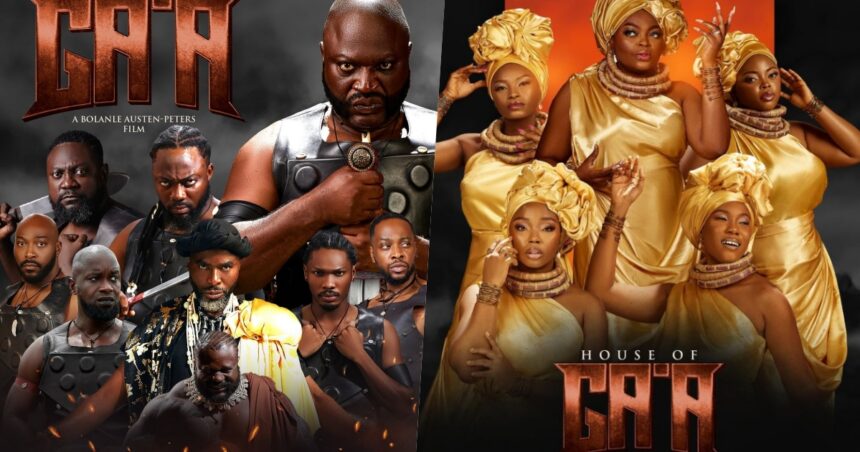We continue to see the surge of epic movies in Nollywood, following Femi Adebayo’s “Jagun Jagun,” “King of Thieves,” Kunle Afolayan’s “Anikulapo,” etc releases. This is primarily owing to the audience’s reception of these types of movies, which have mostly been widely praised by the audience for highlighting traditional and cultural values while evoking the past. However, from the perspective of stakeholders, these movies provide lucrative business avenues, which I feel is the sole determinant for their production in the first place.
House of Ga’a is a biopic about the infamous and tyrant Yoruba Oyo Empire military leader, Ga’a (or Gaha) in the 18th century, who abrogated political power for himself and his family. It is directed by Bolanle Austin-Peters, who previously directed “Funmilayo,” a biopic on another Nigerian historical figure, Funmilayo Ransome-Kuti.
As the film opens, we meet Ga’a (Femi Branch) and his army as they wage war on the Nupe Kingdom. And for his heroics in this and the previous wars, he’s conferred upon the title of Bashorun (Prime Minister, a member of the Oyo-Mesi, the Kingmakers) by Alaafin Labisi (Kunle Coker), who the new Bashorun forces to commit suicide by opening the calabash, which allows the Oyo-Mesi to impeach or pass a vote of no confidence to the ruler, serving as a form of checks and balance.
However, after seizing complete control of power as the new Bashorun, Ga’a appoints his sons and relatives as representatives in several Oyo-controlled towns. His eldest son Olaotan (Jide Oyegbile) is in Dahomey, Olukoye (Femi Adebayo) is in Ibadan, etc. By this time, Ga’a had become so powerful that he was both a king-maker and a king-destroyer.
But as we know, power corrupts, and absolute power corrupts absolutely. Ga’a installs Prince Awonbioju (Muyiwa Ademola), who agrees to all conditions and terms laid down by Ga’a if he were to become the new king. But when this new king refuses to prostrate one night after being summoned from his palace by Ga’a, he’s killed mysteriously. In one of the sociopathic tendencies of a power-drunken despot, Ga’a causes the suicide of yet another Alaafin, Agboluaje (Gbenga Titiloye), because he was underdressed in comparison to another King during the Bebe festival. Ga’a kills yet another king, Majeogbo (Dele Module), who causes the death of one of his sons. But not without himself suffering as he becomes crippled. In the end, he installs Prince Abiodun (Adeniyi Johnson), his in-law, as the new king.
I’m tempted to call “House of Ga’a” a movie-length Wikipedia article after watching it. Bolanle Austen-Peter’s script, written by Tunde Babalola, is hollow, and the whole project brings little to no novelty to what already exists on Wikipedia. The movie is asymptomatic of Nollywood’s general lack of conducting deep and extensive research for historical movies such as this. For example, the war costume of the Oyo-Empire soldiers at the beginning of the movie looks uninspiring and ahistorical.
“House of Ga’a” is a tale of ambition, the allure of power, and the lengths to which an individual would go to maintain this absolute power. In that respect, this is Femi Branch’s movie. He delivered a brilliant performance. And for people who have followed the actor since this is no surprise. But even his flawless rendition is insufficient to elevate this movie.
This movie has several well-known actors, although this has little bearing on how the tale is conveyed. Actors such as Funke Akindele, Toyin Abraham, Femi Adebayo, Lateef Adedimeji, etc, all feature in this movie, but are criminally underutilized, speaking to how Ga’a-centred is the movie. They offered nothing more than replaceable appearances of jealousy towards Zainab, a slave girl, a former Queen of Nupe Kingdom—raided at the beginning of the movie—for whom Ga’a has serious proclivity, making her his wife. I don’t think the fact that the movie is Ga’a centered is bad— after all, it’s a biopic—, but why have a host of A-list actors if they won’t move the script forward? Is it to give the movie its epic allure? One could argue that they were nothing more than a commercial stunt, given that we saw Funke Akindele in the trailer.
Oyemekun (Mike Afolarin), Ga’a’s youngest son, narrates “House of Ga’a” via voiceover. However, this narration, like the secondary story of Oyemekun’s love for Prince Abiodun’s daughter, Agbonyin, can come across as flat at times and ineffective.
“House of Ga’a” could have been improved. However, for its aim at historicity, it would have the audience seduced like other movies. But, in the end, the movie is just a pale piece of entertainment scared to bite off more than it can chew. This biopic, “House of Ga’a” from Bolanle-Austen Peters fails to compel and deliver like the director’s previous biopic work, “Funmilayo Ransome-Kuti,” despite being star-studded.
Rating: 5/10
















